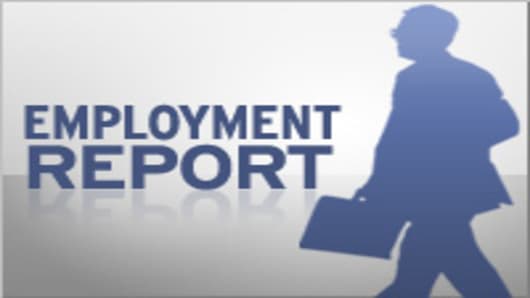The worsening credit crisis is creating even more uncertainty about the labor market outlook and there was little consolation in the jobs report Friday.
All signs are pointing to further deterioration in the months ahead. The big question is how bad it will get and how quickly.
“I've been surprised that things aren’t worse given the nature of the financial crisis over the last 13 months,” says Stephen Davis, an employment expert and a professor at the University of Chicago’s Graduate School of Business. “The good news is that labor markets have proved quite resilient in the face of a major shock. The bad news is there is a long way to go down."
Friday's report on September employment illustrated that. Non-farm payrolls fell 159,000, much more than the consensus forecast of 105,000. That follows a bigger-than-expected decline of 84,000 jobs in August. The unemployment rate is remained at 6.1 percent.
On Thursday, the government reported that weekly jobless claims rose to a seven-year high of 497,000, while the four-week moving average rose to 474,000. Continuing claims rose to a five-year high.
For Investors
- Is This Really the Market Bottom?
- Five Ways to Play This Wild Market
- Jim Cramer's Web Exclusive: Pans
- Buffett's Three Rules for Crisis Investing
The last deep—and industrial-oriented—US recession was in 1980, which claimed millions of jobs, sent unemployment to double-digit levels and dragged on for about two years.
Although Davis says the "the current state of the labor market and economy as a whole is nothing like the experience we had in the 1980s,” he adds that it’s too soon too tell if labor markets are headed in that direction.
There are some worrisome signs: the recent spike in weekly jobless claims, the number of mass layoffs and the downsizing of Wall Street.
David Resler, chief economist at Normura International, says there’s no denying the “underlying deterioration in the job market.”
He recently revised his worst-case scenario for the jobless rate in 2009 from 7 percent to 7.8 percent. That’s clearly recessionary territory. Payroll declines, this far, has been less definitive, but are also expected to pick up.
If the September decline comes in as forecast or higher, it will be the highest since payrolls started declining at the beginning of the year.
Thus far, total losses have been historically low—606,000 jobs since employment peaked in December 2007, which is when some say a recession began.
By contrast, during the last recession, payrolls fell 1.63 million during the March-Nov 2001 period. They continued to fall for almost another two years, until 2.7 million jobs had been erased. (Payrolls did not regain their pre-recession peak until February 05.)
Given that the labor market lags the broader economic cycle, few doubt the worse is yet to come, especially as the credit crunch spreads to other parts of an economy, as it also appears to be suffering from a conventional cyclical downturn.
The Institute for Supply Management’s employment index plunged 41.8 from 49.7, with nine of the 12 industries reporting declines.
Employment consulting firm Challenger, Gray & Christmas said planned corporate layoffs rose to 95,094 in September, up 33 percent from the year-ago period, increasing the likelihood that overall layoffs will top the million mark for the first time since 2005.
Bill Warren, executive Director of the non-profit JobCentral.com, has seen a dramatic slowdown in hiring “almost across the board” since August. “Companies are looking to fill only those post critical to their operations today.”
“They're trying to evaluate what the impact is going to be,“ says Warren, whose firm counts most of the Fortune 500 as clients. “Certainly the biggest thing on their mind is credit availability and money flow.”
“There's no visibility, so corporations aren't going to hire,” says Madeline Schnapp, director of Macroeconomic Research at TrimTabs Investment Research, adding that “Things sort of fell off a cliff,” in September, as the credit seize hit the economy.
TrimTabs employment data, which is based on the daily payroll data companies report to the Treasury, shows a job loss of 231,000 in September, a level not seen since late in the recession of 2001.
So, big pain may be on the way for the financial services sector
“So far there are no real cuts, firm cuts announced by Merrill[Lynch], Lehman [Brothers], Fannie Mae, Freddie Mac and other companies,” CEO John Challenger told CNBC. “You know it’s coming.”
Government job data bear that out. Payrolls in the financial services sector, which includes the insurance, mortgage and other industries, are down just 105,000 since their peak in August 07. (During the 2001 recession, payrolls actually rose—by 67,000.)
By contrast, the construction industry has lost 558,000 since its January 2007 peak, five times that of the 2001 recession, showing that the credit crunch has already taken its toll.
“Whatever data we have now is kind of a rear-view mirror situation,” says economist Christopher Rupkey of Bank of Tokyo-Mitsubishi. “The shock to the system following the Lehman bankruptcy is off the Richter scale in terms of magnitude. Next month will tell the tale.”





